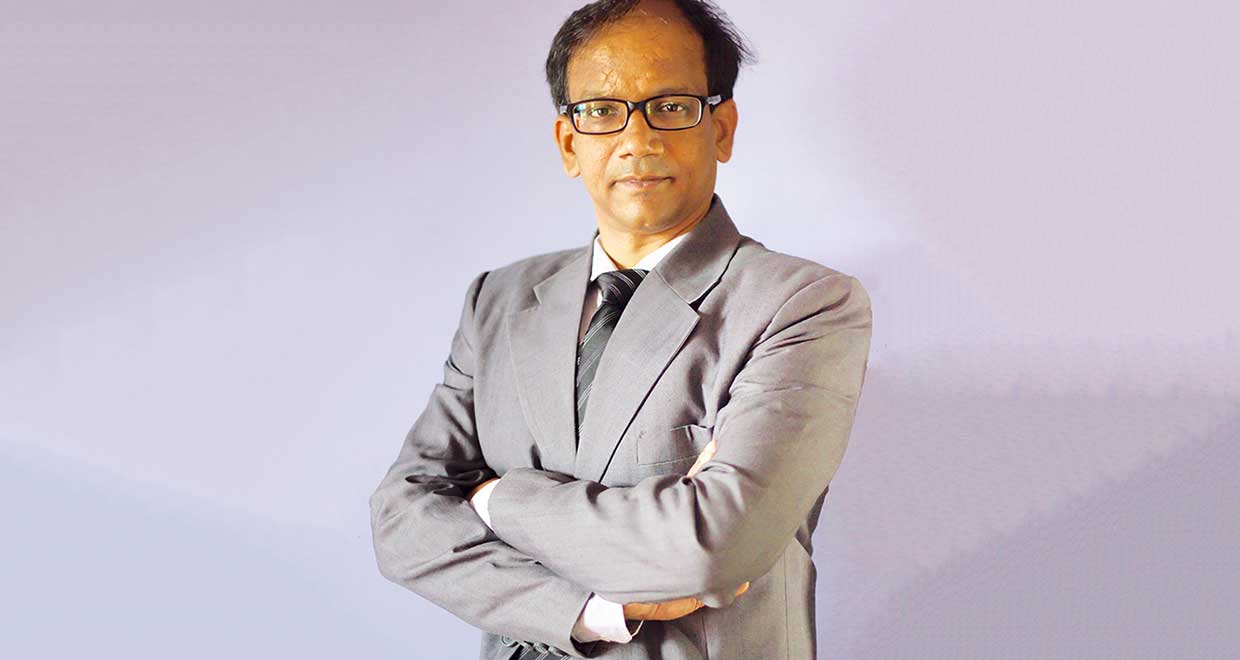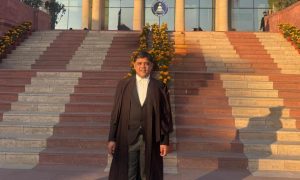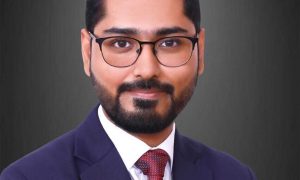Pradeep Jain qualified in law from Devi Ahilya Vishwavidyalaya in 2000. Thereafter, he joined Singhania & Co. in 2002 and was soon rewarded with partnership in 2004 for his excellent work in the Corporate Practice & Maritime Laws. He has played pivotal role in a number of big joint ventures and corporate takeovers. He is also regularly engaged by the Institute of Company Secretaries of India, New Delhi, to deliver lectures on various subjects related to law.
Pradeep frequently advises clients on matters relating to the development and control regulations, policy and regulatory matters, compliances relating to Securities Exchange Board of India, Reserve Bank of India, Insurance Regulatory & Development Authority and Foreign Investment Promotion Board. He regularly advises vessel owners, charterers and P&I clubs on various maritime laws. Pradeep also represents his clients in international arbitrations under the Singapore International Arbitration Centre, Singapore Chamber of Maritime Arbitration and London Maritime Arbitrators Association. He is vastly renowned for his acumen in liasoning with the Foreign Investors Promotion Board (FIPB)/ Secretariat for Industrial Assistance (SIA) in the matters related to Transfer of Shares from Resident to Non-resident, foreign technical collaboration, liasoning with the Securities Exchange Board of India (SEBI) filing various form or Report in the matters related to Takeover, Mutual Fund, Assets Management Companies, Trusteeship, Custodian, Foreign Institutional Investors etc.
In this interview Pradeep talks to us about:
- His experiences working with Singhania & Co.
- The importance of a mentor in a junior lawyer’s life, and important traits any law aspirant should cultivate
- Networking and the legal profession, and
- His valuable advice to all the young lawyers/students/aspirants out there.
How would you like to introduce yourself to our readers?
A lawyer by profession, I am the Managing Partner of the Mumbai office of Singhania & Co. I come from a family of businessmen; however, my fondness for academics led me to gathering multiple degrees in the fields of science, mathematics and law and finally pursue a career as a lawyer. I joined Singhania & Co. in the year 2002, and actively worked under the tutelage of Mr. D.C Singhania, the Founder of Singhania & Co. and a veteran lawyer widely recognised for his dexterity in the areas of litigation and arbitration. Thereafter, in a short span of 2 years I was promoted to Partnership and there has been no looking back ever since.
Going back to your graduation days are there any anecdotes you would like to share?
It was a very interesting journey. You would be surprised to know that I never wanted to be a lawyer, but my Mom was convinced I would be a litigating lawyer, as I would always grab opportunities to show case my oratory skills, and of course pick up arguments.
I loved studying mathematics and science and wanted to pursue a course related to these subjects. So my first effort was to appear for medical examinations and be a doctor. Unfortunately, I couldn’t sit for the exams due to personal exigencies. Thereafter, I decided to not waste a year and ended up pursuing a degree in mathematics and went on to pursue my Masters in it.
I didn’t want to stop studying so I undertook the company secretary course during which my mentor Mr. Sunil Jain, advised me to explore law as a profession.
I took his advice and I have loved every moment of this profession!
How do you recall the first few years after qualifying in law?
I have always felt that I have been fortunate and lucky in a lot of scenarios in life. I have been lucky to get picked first, or noticed in a group, and this is what happened with me in Singhania.
The first few years of my career were nothing short of absolute delight.
My partner, Mr. Sameer Rastogi, whom I was assisting in the initial days of my career at Singhania in 2002, liked my research skills and ideas of solutions to client issues and legal opinions drafted by me. He ensured that I was a part of important client mandates. He never failed to mention my name in other offices which helped me work and interact with different offices of the Firm and definitely aided my quick promotion to Partnership in 2004.
Everyday brought in new avenues to learn and grow. Luckily, I was part of a firm that pushes lawyers to get out of their comfort zone and handle matters with independence. We were not treated as “Associates” working for a monthly compensation; we were instead treated as active, thinking and performing individual professionals who have the capability of servicing clients with minimal supervision.
Please tell us about the relevance of a mentor as a young lawyer, how did you find your mentor?
Having a mentor in the formative years of your career is definitely important. When we enter a new professional field, especially the legal industry, we have certain ideas about the profession in our head, and it is easy to face disappointment if we do not have a guide to help us understand the profession. Mentoring helps individuals understand the practical aspects of law and provides necessary guidance to assist individuals in making rational career decisions.
At the cost of repetition, I would say I was fortunate to have Mr. D. C Singhania as my mentor. I was extremely surprised at the humility of one of the most sought after lawyers in India and his down to earth personality. Besides honing my legal acumen, he has helped me understand the importance of the nobility of our profession. He encouraged each and every lawyer including interns to express their opinions on matters and be independent in handling matters. If you trace the history of our Firm, you will know that through his mentoring he has instilled the confidence in many lawyers who are now running their own firms or are successfully handling Partnership positions.
I never thought that I would end up as a Managing Partner of a firm, however, as mentioned before, it was through the guidance of my mentor that I learned about my capabilities and my true potential as a lawyer. I was guided to take initiative and encouraged to shoulder both legal and managerial responsibilities leading me to where I am today.
Even today, Singhania & Co. actively encourages all young lawyers to aim at being independent and self-sufficient. Our Firm follows an active policy of mentoring freshers and interns into confident professionals who possess the capability of sourcing and servicing their own clients.
What role does academics play in the legal profession? Given that maritime law requires a lot of reading, how has it been in your case?
It goes without saying that an affinity to read and keep yourself updated is mandatory in our profession. A student who is academically bright showcases this ability and therefore has a better chance in terms of placements.
Having said that, academics is one of the many ingredients that make a good lawyer. One needs to be interesting enough for clients to notice you and that involves having great people skills. Being persuasive, having a flair for writing, ability to network and socialise professionally are some of the other key components that will give young lawyers an edge over the others.
A popular lawyer is usually a person who is blunt, bold and can mesmerise the court or audience with his words.
To have such qualities you must have knowledge of history, philosophy along with knowledge of statutes. The more you read more confident you are to interact with your clients and fellow professionals.
I always tell students, juniors that when you are younger, you will get time to read. So please learn as much as possible because as you grow, no matter how much you are earning, you will not get time to read.
You are noted as one of the leading maritime lawyers in India. Very few students focus on maritime laws during their formative years. Could you tell us more about maritime practice in India?
Hahaha (blushing).
Shipping laws require extensive reading and research. Moreover practice of maritime law is not restricted to one country and in most of maritime arbitrations we deal with, English laws are applicable and one must be aware of the laws, rulings and authorities to be fully prepared for arbitrations.
Founded in 1969, Singhania & Co., has been one of the very few law firms to have maintained a steady practice for all these years. Tell us more about the firm and its heritage.
Singhania & Co. as mentioned earlier was founded by Mr. D.C Singhania in 1969. Mr. D.C Singhania is a highly respected lawyer with over four decades of experience.
He was very well aware of the industry and its potential. He also recognized the importance of treating the profession as a service and keep the clients interest at paramount. He always emphasized on delivering good service to the Client.
Mr. D.C Singhania, was innovative in his approach and avoided a lot of stereotype functioning of firms back then. While the popular trend was to be recognized for practicing in a particular court, he went on to successfully argue in various forums and didn’t restrict himself just to the High Court or Supreme Court.
This is also why world best lawyers associations like “Lex Mundi” and “Terralex” felt announced Singhania & Co as first Indian member law firm.
Over the years our Firm has been in involved in various noted arbitrations such as Western Company of North America v ONGC, and Alsthom v Railway Board of India amongst others. Our Firm has represented over 1000 international client organizations with their matters in India or abroad including fortune 500 comp
Currently, Singhania & Co. operates out of 10 offices including an office in London. In India we have offices in New Delhi, Mumbai, Hyderabad, Indore, Bangalore, Kolkata, Chennai, Ahmadabad
The breadth of our practice includes Admiralty, Anti-Dumping, Aviation, Arbitration & Dispute Resolution, Banking, Securities and Financial Services, Corporate &; Commercial, Infrastructure, Intellectual Property, Joint Venture & Technology, Litigation, Mergers & Acquisitions, Technology Transfer, Project Financing, Capital Market, Private Equity and Fund, Securitization & Structured Finance and Taxation laws.
Please tell us about your journey at Singhania & Co.?
My journey in Singhania is as dramatic as my entry.
Interestingly, I had to go the ICSI regional office and I ended up at the office of Singhania & Co. Once the seniors spoke to me and heard about my profile, they decided to take an interview and I was hired!
Since then, it has been a wonderful journey. I have learned a lot about the profession and I guess I am still learning!
We are very curious to find out how do you find time for yourself despite heading busy offices in Mumbai and Indore? What would be your tips to the young lawyers on time management?
Haha. My friends never find me reading and my clients never see me executing works except on meetings. In fact I don’t take up my role as a Managing Partner as work.
I like doing it and I treat it as fun and I end up having fun. I love the energy and rush involved in solving legal issues and that is why I never feel tired. I believe that if you enjoy your work and don’t take work as a task and then you will see that you are full of positive thoughts and energy.
It is very simple. If we can sincerely work (with minimal or no distractions like calls/facebook/whatsapp etc.) for at least 8 hours a day, we can accomplish a lot more than we imagine. Being busy is dependent on how sincerely you manage your 24 hours. As a junior, my job was to be well equipped with my research and ensure that all deadlines are met. I therefore dedicated my time in office towards working and/or reading up in case I was free. That way, I would always have time for myself when I was back home. My role as a managing partner requires me to delegate and ensure that the work gets done. I also shoulder the responsibility to keep my clients and my team happy. I dedicate my time in office towards the same and still find time to pursue my interests.
We have seen that many law students are faced with tough choice between attending classed and pursuing internships. What, according to you, should be the correct balance between academics and practical exposure?
I would suggest students to take time out from their courses to intern as much as possible, as it provides a lot of practical experience and knowledge about the legal industry which cannot be learnt through books but at the same time they should not make life too serious and try to find ways to maximize once output in lesser time.
Due to developments in technology and advancement of social media, networking and connecting across globe has become much easier. How have these developments affected the legal profession and the way in which lawyers have been working so far?
Absolutely! Much has changed in terms of technology and for the better!
It is much easier to network now than it was 15 years ago. It is easier to interact with a lawyer/firm you intend to work with even before you have met the Firm. It is much simpler to verify details about a particular firm/person now than it was a few years ago. That is how much technology has evolved.
Networking sites allow lawyers to not just network but also freely exchange and share knowledge and insights on various laws and its impact.
If used wisely, it is a very strong tool for a lawyer and can help us make our noble profession nobler but it has some draw back as well which should be fixed. I see young generations spend a lot of time distracting themselves on social media which eventually decreases their productivity and also sometimes explains unnecessary longer working hours!
Finally, any word of advice for all the young and aspiring lawyers?
Be bold, blunt and honest. Pursue power through your hard work, knowledge and never forget your responsibilities towards society.
Self-evaluation helps you become a better professional and to excel when pitted against both contemporaries and seniors!
Life is not a race but definitely a marathon so invest in yourself and in knowledge and not money in your early years.


























